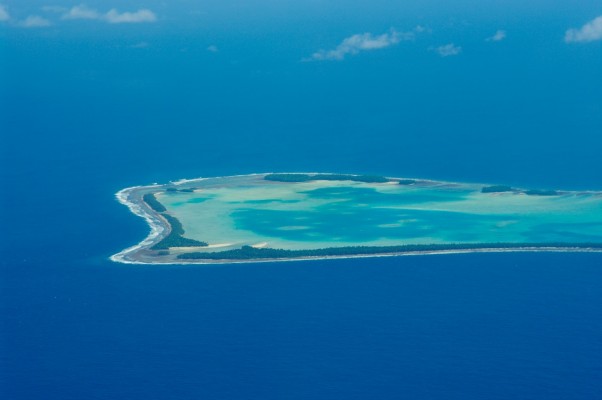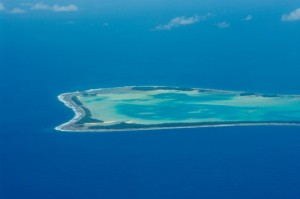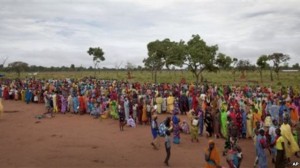
The Implications of Climate Change on the Islands of the Asia Pacific
The article below is written by Dhanasree Jayaram, a research scholar at Manipal University in Karnatka, India. It is adapted from a larger article: “Geostrategic Implications of Environmental Change for Island Nations: A Case Study of Indo-Maldivian Equations”, published in the Spring 2013 edition of the Air Power Journal, New Delhi. Dhanasree brings up some very important questions, especially: What will the world do when the first nation falls beneath the waves? – Andrew Holland, ASP Senior Fellow for Energy and Climate

Statehood and Sovereignty of Island Nations
The likely impacts of environmental change, especially climate change, on island nations around the world has been well-documented by the scientific community across the world. The islands could become uninhabitable due to either flooding/submergence or by a crunch in the availability of freshwater resources. Politicians in these nation states have set alarm bells ringing over the future of their territories and population by raising the issues of human rights and sovereignty in various international forums. Adaptation and mitigation are two legs of any country’s climate change policy and these island states are no different. To add to the problem, if an entire island is wiped off the earth due to sea level rise or beach erosion, the concept of statehood would have to be revisited in order to establish parity. In this context, the geopolitical, economic, socio-cultural and legal implications of such developments are immense especially for countries such as islands of the South Pacific, Maldives, Japan, Indonesia, India and other countries in the Asia-Pacific that are either island nations or have significant amount of territory in the form of islands. There is a need to understand these issues that have received very less attention due to their complex, unpredictable and, as of yet hypothetical nature.
Impact of Environmental Change on Island Nations
As far as the impacts of environmental change on island nations is concerned, these countries are already coping with a series of problems such as beach erosion, crunch in freshwater resources, excessive waste, sea level rise, to name just a few. Beach erosion augments the threat of storm-induced erosion and flooding which affects the marine diversity, which in turn affects coral reef fish population and impacts the livelihoods of the fishermen. Availability of freshwater resources has been constrained by high density population in some of the island nations such as Maldives. Intrusion of saltwater is also having an adverse impact on both natural and agricultural crops. As far as the impact of ‘climate change’ on island nations is concerned, the rising sea levels have been identified as the biggest threat that could result in beach erosion, more powerful storms, higher storm surges and threats to biodiversity. It is also an acknowledged fact that coral growth could be stunted due to the phenomena of coral bleaching and increased sea erosion, rising water temperature and ocean acidification.
 To cite a few examples, Tuvalu – an island nation in the Pacific – declared a state of emergency due to acute shortage of freshwater in 2011. The problem was so urgent that freshwater supplies had already run out in some areas, especially due to poisoning of well water by rising tides. Water supplies and desalination units were carried to Tuvalu from New Zealand as a short-term measure. Kiribati was the first victim of submergence of uninhabited islands in 1998. India was struck in 2006, when the island of Lohachara, inhabited by 10,000 people was washed off the map. The island lay in India’s part of the Sundarbans. This was the first time that an inhabited island became a victim of the rising sea levels. A dispute between India and Bangladesh over an island called the New Moore Island resolved itself when it was engulfed by the rising sea water in 2010. The island nations have been raising their voices in the international climate change negotiations to make a clarion call to the international community to come to the understanding that the actions of the industrialized and emerging countries would impact them more than any other country on the surface of the earth, as it could put their very existence at risk.
To cite a few examples, Tuvalu – an island nation in the Pacific – declared a state of emergency due to acute shortage of freshwater in 2011. The problem was so urgent that freshwater supplies had already run out in some areas, especially due to poisoning of well water by rising tides. Water supplies and desalination units were carried to Tuvalu from New Zealand as a short-term measure. Kiribati was the first victim of submergence of uninhabited islands in 1998. India was struck in 2006, when the island of Lohachara, inhabited by 10,000 people was washed off the map. The island lay in India’s part of the Sundarbans. This was the first time that an inhabited island became a victim of the rising sea levels. A dispute between India and Bangladesh over an island called the New Moore Island resolved itself when it was engulfed by the rising sea water in 2010. The island nations have been raising their voices in the international climate change negotiations to make a clarion call to the international community to come to the understanding that the actions of the industrialized and emerging countries would impact them more than any other country on the surface of the earth, as it could put their very existence at risk.
Implications of Environmental Change for the Island Nations
Two primary factors – statehood and maritime boundaries – are expected to be affected most seriously as a result of geographic alterations. The existing international laws and conventions have several loopholes especially since they do not take possible environmental change and geographical alterations into consideration. Article 1 of the Montevideo Convention on Rights and Duties of States (1933) outlines four principles that mark the existence of a state – (a) a Government; (b) a defined territory; (c) a permanent population; and (d) a capacity to enter into relations with other states. The question is, if an island nation gets submerged or becomes uninhabitable in future, would it still be considered a ‘nation state’? If the islands do not disappear but become uninhabitable due to various reasons such as the lack of freshwater resources, large-scale subsidence or frequent storm surges, even then the need for resettlement of its population becomes an international duty and responsibility. In such a case, it would still have the territory (albeit uninhabited) but, in the process of resettlement, will the country still retain its political, economic and administrative structures if it is ‘forced’ to occupy other nation states’ territories? If the island nation is left without a Government, then its capacity to enter into relations with other states is questionable.
An island nation has four main options. First, it could elevate certain part of its territory and shift all or some of its population to the elevated territory to maintain its statehood. Second, it could create an artificial island in which case the law is unclear about a nation state’s rights. It would still qualify as “defined state territory for purposes of “statelessness,” and may also be recognized internationally as defined territory on the basis of fairness”. In addition, the permanent population criterion has been satisfied before the UN by a number of people as low as 50. Third, it could have a Government in ‘exile’ or a virtual Government. Yet another way has been shown by Kiribati in 2012, when the country’s President announced that he was holding talks with Fiji’s Government to buy up to 5,000 acres of “freehold land on which his countrymen could be housed” as rising sea levels were causing many of the atolls to disappear fast. Many other island nations have been contemplating this form of bilateral talks with countries with excess unoccupied lands and are culturally/politically compatible to shift their population. If it fails to exercise these options, its statehood could be lost; along with it, its territorial rights over various natural resources including fishing grounds, oil and natural gas reserves as disappearance of the islands could lead to the conversion of their erstwhile territorial region into international waters under the United Nations Convention on the Law of the Sea (UNCLOS). It is very clear that the UNCLOS has been framed for an unchanging environment and the law does not specify the line of action that could be adopted in case existing coastlines and islands vanish resulting in a change in maritime boundaries. The Convention states that a country’s maritime Exclusive Economic Zone (EEZ) extends 200 nautical miles off its coastline, unless it has a continental shelf, in which case the seabed claim can be extended up to 350 nautical miles from the coastline. An “artificial island” can have only a 500 meters safety zone. Therefore, it may not be economically feasible to build an artificial island under the present law for statehood. The island nations could freeze its maritime boundaries to secure its EEZ and hope that no one would challenge or revise it.
 The usage of the terminology of ‘refugee’ in this context would be lop-sided in case ‘citizens’ of a particular country are forced to leave their countries which would be left with just ocean waters. It has multiple connotations, mostly negative besides the inherent implications of ‘human rights’. Some of them include – dependency, lack of autonomy, statelessness, protection by international law among others. Although the UN does not recognize refugees created by environmental crises under the United Nations Human Rights Commission (UNHCR), in the future the chances of their recognition are palpable. However, it would be better not to categorize the peoples of island nations as refugees as they would be politically and economically stable, assuming they can retain rights to revenue generating mechanisms such as fisheries, internet domain registration, seabed mining, stamp production, etc.
The usage of the terminology of ‘refugee’ in this context would be lop-sided in case ‘citizens’ of a particular country are forced to leave their countries which would be left with just ocean waters. It has multiple connotations, mostly negative besides the inherent implications of ‘human rights’. Some of them include – dependency, lack of autonomy, statelessness, protection by international law among others. Although the UN does not recognize refugees created by environmental crises under the United Nations Human Rights Commission (UNHCR), in the future the chances of their recognition are palpable. However, it would be better not to categorize the peoples of island nations as refugees as they would be politically and economically stable, assuming they can retain rights to revenue generating mechanisms such as fisheries, internet domain registration, seabed mining, stamp production, etc.
Time to Revamp the Legal Infrastructure
It is very clear that there is dire need to alter the existing legal infrastructure or create a new one so that sovereignty is redefined. If multilateralism has to work, the legal fraternity has to look at the seas with a fresh outlook to avoid conflicts such as the one brewing in the South China Sea. Island nations have had striking differences with the industrialized and emerging countries over the rising temperatures and reduction of carbon emissions. They have always pressed for a legally binding agreement and a temperature rise to well below 1.5˚C. For example, former President of Maldives, Nasheed, gave a rousing speech at Copenhagen in which he reiterated, “Carbon concentrations higher than 350 parts per million, and temperature rises above 1.5 degrees, will submerge my country, dissolve our coral reefs, turn our oceans to acid and destabilize the planet’s climate.” He continued, “For global emissions to peak by 2015 as science demands, industrialized countries must raise their level of ambition. They must commit to collective reductions of 40% by 2020, and 95% by 2050. But developing countries must also do their bit.” Their role in securitization of the climate change issue by taking the issue to the United Nations Security Council is instrumental. It is time for them to stop entangling themselves in the labyrinth of debates since the debates are expected to take their own course depending on how different countries define their national interests. Meanwhile, the island nations are left to themselves to protect their national interests.






[…] The Implications of Climate Change on the Islands of the Asia Pacific […]